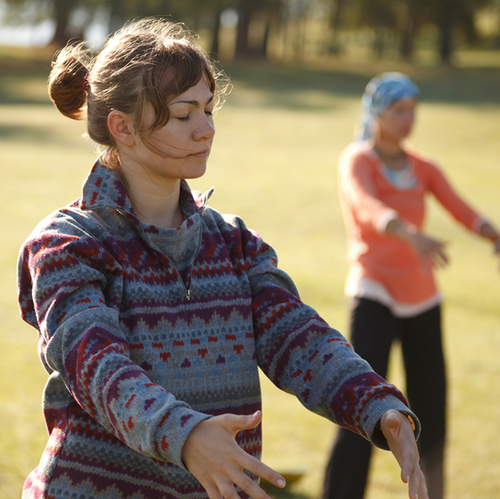
Qi gong
Alternate names: Ba Duan Jin, Baduanjin Qi Gong, Biyun Method, Biyun Qi Gong, Chan Mi Gong, Chi'I Kung, Chi Gung, Chi Kung, Dantian, Daoyin Qi Gong, Dongeui Qi Gong, Eight-Section Brocades Qi Gong, Energy Healing, Energy Health, Energy Medicine, Energy Therapy, Energy Work, EQT, External Qi Gong Therapy, Five Animals Qi Gong, Guolin, Hua Gong, Medical Qi Gong, Médecine Énergétique, QG, QI, Qigong, Qigong Healer, Qigong Therapy, Qi Gong Therapy, Qi Gong Yangsheng, Qigongology, Santé Énergétique, Thérapie Énergétique, Wuqinxi, Yi Jia Gong
Background
Qi gong is a martial art-like exercise from traditional Chinese medicine that attempts to regulate mind, body, and breath.
In traditional Chinese medicine, it is believed that disease is caused by a blockage or imbalance of energy flow in the body. Qi gong is thought to help unblock or balance energy flow and help the body heal.
People use Qi gong for high blood pressure, back pain, asthma, cancer, osteoarthritis, fibromyalgia, and many other conditions, but there's no good scientific evidence to support many of these uses.
Don't confuse Qi gong with Kampo medicine, traditional Chinese medicine, or tai chi. These are not the same.
In traditional Chinese medicine, it is believed that disease is caused by a blockage or imbalance of energy flow in the body. Qi gong is thought to help unblock or balance energy flow and help the body heal.
People use Qi gong for high blood pressure, back pain, asthma, cancer, osteoarthritis, fibromyalgia, and many other conditions, but there's no good scientific evidence to support many of these uses.
Don't confuse Qi gong with Kampo medicine, traditional Chinese medicine, or tai chi. These are not the same.
Safety Safety definitions
Qi gong is likely safe when practiced for up to 1 year. There are no known safety concerns. Like any exercise, Qi gong might cause muscle pain and tenderness.
Special Precautions & Warnings:
Pregnancy and breast-feeding: There isn't enough reliable information to know if Qi gong is safe when pregnant or breast-feeding. If you are pregnant, check with your healthcare provider before starting Qi gong or any other exercise program.Effectiveness
NatMed Pro rates effectiveness based on scientific evidence according to the following scale: Effective, Likely Effective, Possibly Effective, Possibly Ineffective, Likely Ineffective, Ineffective, and Insufficient Evidence to Rate.
Possibly effective Effectiveness definitions
- Tiredness in people with cancer. Practicing Qi gong might reduce feelings of tiredness in people with cancer.
- A lung disease that makes it harder to breathe (chronic obstructive pulmonary disease or COPD). Practicing Qi gong might help people with COPD walk farther. It might also help to improve their breathing and quality of life.
- High blood pressure. Practicing Qi gong might help to lower blood pressure in people with high blood pressure.
Dosing & administration
The main principles of Qi gong include breathing, intentional movement, relaxation, stance, visualization, and awareness. There are many different types of Qi gong. Some forms of Qi gong have been specially developed for certain conditions.
Qi gong sessions may last for anywhere from 20-90 minutes and can be performed as often as daily or as little as once per week. Talk to your physician or other healthcare professional to learn more about how Qi gong is used for specific conditions.
Qi gong sessions may last for anywhere from 20-90 minutes and can be performed as often as daily or as little as once per week. Talk to your physician or other healthcare professional to learn more about how Qi gong is used for specific conditions.
Interactions with pharmaceuticals
It is not known if this treatment interacts with any medicines. Before using this treatment, talk with your health professional if you take any medications.
Interactions with herbs & supplements
There are no known interactions with herbs and supplements.
Interactions with foods
There are no known interactions with foods.
vital.ly has licensed monographs from TRC Healthcare.
This monograph was last reviewed on 13/06/2025 10:00:00 and last updated on 09/11/2020 23:15:04. Monographs are reviewed and/or updated multiple times per month and at least once per year.
Natural Medicines disclaims any responsibility related to medical consequences of using any medical product. Effort is made to ensure that the information contained in this monograph is accurate at the time it was published. Consumers and medical professionals who consult this monograph are cautioned that any medical or product related decision is the sole responsibility of the consumer and/or the health care professional. A legal License Agreement sets limitations on downloading, storing, or printing content from this Database. No reproduction of this monograph or any content from this Database is permitted without written permission from the publisher. It is unlawful to download, store, or distribute content from this site.




